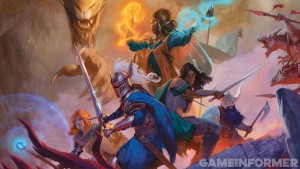Please support Game Informer. Print magazine subscriptions are less than $2 per issue
The Virtual Life — Deus Ex: Mankind Divided’s Tragic Soul Shines In Its Quiet Moments

Johnny Gunn sits in the middle of what might have one time or another been a living room, rubbing alloy hands through his hair. He’s a man with a lot on his mind. Out back, behind the complex of broken down apartments we’re standing in, his ex-wife was strangled to death and torn to bits. The police think Johnny did it.
This, reader, is where I come in. That’s me, nosy Adam Jensen, who just can’t help getting embroiled in things that aren’t my business. I’m the half-man, half-robot version of some character you might find in a Hammett novel, a pesky gumshoe wannabe who’s done a lot of bad things for what he thinks are the right reasons.
I ask Johnny about his wife. He shows little remorse, says she’s an “ex” for a reason. I ask him about his being a former employee for Belltower, a private security division. He speaks openly about his time across seas, roughing up people for a paycheck and getting various bits and bobs on his body replaced with machine. I’m sympathetic. I take a look around the place. There are more discarded boxes of beer and empty liquor bottles than there is floor space. In the bathroom I discover sobriety chips on the sink, long-forgotten and covered in dust. A medical report crumpled in a cardboard box suggests our guy has some form of PTSD.
Johnny Gunn didn’t kill her, I decide. He’s too broken of a man. I walk back into the living room and press him further, gently. Soon I find out his alloy fingers lack fingerprints. There were fingerprints on Angie’s neck. I decide that’s enough evidence for me and leave him to stew in his own personal hell. There are no conversation options for me to offer my sympathies as I depart but, then again, what is there to be said?
I leave and, deciding to kill some time, break into the apartment across the way. It belongs to a woman named Daria. She owns a lot of cat statutes but no cat of her own, apparently. The place is nice and tidy, not spotless, but a level of cleanliness that suggests she dusts everything occasionally. I examine her living room and find some credits on the table next to the couch but don’t take them. There’s a telescope in her room pointed at other apartments Rear Window style. Suddenly I feel less gross about exploring a stranger’s apartment. After all, in a world where everyone is spying on everyone in some form or another, isn’t privacy a dead concept?
When I’m done, I leave just as quietly as I came, disturbing nothing and closing the door behind me. It was like I was never there. My pockets are not lined with her belongings. I have taken nothing other than some knowledge about what this person’s life might be like.
Deus Ex: Mankind Divided works bests in these quiet moments. For all its huffing and puffing about creating a game that tackles real-world events, the game ultimately doesn’t know what to do with its political inspirations except create dissatisfying analogs to tragic contemporary headlines that mostly serve as nothing more than a catalyst for some ho-hum conspiracy fiction. Cutscenes show bystanders being ruthlessly gunned down by state police, bombs planted by terrorists blow apart subway stations and kill countless people. It’s all very bombastic and stylish in a way that feels more like a poor man’s Children of Men and The Dark Knight.
That being said, riches are tucked away at the corners of this assemblage of sci-fi clichés: apartments and offices, so meticulously designed that you can feel the presence of the people who inhabit them walking alongside you. Sometimes I’m pilfering through them in search of pass codes or weapon attachments. Most of the time though, I’m just being nosy, exploring every corner of the hub world. Nearly every room I find is a treasure trove of subtle storytelling, like Johnny Gunn’s self-imposed prison or a trashed luxury apartment filled with drugs belonging to a fresh corpse tucked halfway beneath his bed, a message from a loved one on the PDA next to his hand.
These are places that belong to people who live in fear, staring out at a world that’s gone to hell. As part of a generation that’s grown up watching reports of disasters and unspeakable atrocities, often carried out by both individual terrorist groups as well as people and organizations charged with upholding the law and safeguarding human lives, this is a terrifying sense of powerlessness I can relate to. The thing about modern political terror, the kind that Mankind Divided is trying to exploit with mixed results, is that it isn’t limited to big moments of explosive horror but also includes their silent aftershocks, like someone constantly wondering if they’re going to become a target because of their skin color, gender, or sexuality or a victim of the sort of “random” gun violence that seems to become more and more prevalent with each passing day.
When Mankind Divided zeroes in on this kind of horror, the kind that needles your brain when you’re all alone, the one that sounds like John Hawkes whispering in your ear “Is this gonna be our time?” like he does in Winter’s Bone, it’s unmatched in both the terror it instills and the sympathy it offers everyone trying to make it through these maddening modern times.











